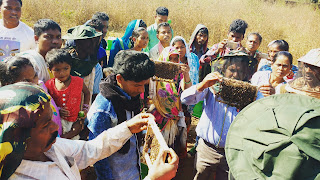The Indian Perspective on Bee Conservation:How different is from the western world's articles on social bees v/s solitary bees.
Bees play a vital role in maintaining ecosystems and ensuring food security around the world. In recent years, the conservation of bees has gained significant attention due to their declining populations. While bee conservation efforts are often discussed in a global context, it is essential to understand the unique Indian perspective on bee conservation, particularly focusing on indigenous social bees that distinguish India from the Western world. Many articles written from the western countries saying that saving honey bees is not a bee conservation at all. It might be true for countries like USA since there are no indigenous social bees in the country. Apis mellifera colonies were imported from Europe and are imported every year from Australia as well.These articles are wrongly interpreted by readers of India who are unaware of indigenous social bees existing in our ecosystems.
Biodiversity and Bee Diversity in India
India is a land of rich biodiversity, housing a diverse range of ecosystems, from the Himalayan mountains to the tropical rainforests of the Western Ghats. This incredible biodiversity extends to the world of bees as well. India is home to over 719 species of bees, including both honeybees and solitary bees.
Unlike Western countries, where the European honeybee (Apis mellifera) is the dominant species for honey production and pollination, India has a more diverse array of social bees. Indigenous social bees such as Apis cerana indica (the Indian honeybee), Apis dorsata (the giant honeybee), and Apis florea (the dwarf honeybee) have played a crucial role in the country's agriculture and culture for centuries.
The Importance of Indigenous Social Bees
Indigenous social bees, especially Apis cerana indica and Apis dorsata, are uniquely adapted to the Indian climate and landscape. These bees have developed specific behaviors and nest-building techniques that make them well-suited to various ecological niches in the country.
1. Apis cerana indica: The Indian honeybee is known for its adaptability to a wide range of climatic conditions, making it a valuable pollinator for a variety of crops, including mangoes, guavas, and mustard. These bees also produce distinct types of honey with potential medicinal properties. Apis cerana can be domesticated in the wooden hives. However, due to its high desertion tendency and swarming characteristics, it requires more skills to sustain the colonies throughout year.
2. Apis dorsata: The giant honeybee, with its enormous open-air nests, is a magnificent sight in the forests of India. These bees play a critical role in pollinating forest plants and trees, contributing to the regeneration of the ecosystem.
Conservation Challenges and Efforts
Despite their ecological importance, indigenous social bees in India face numerous conservation challenges. These challenges include habitat loss due to deforestation and urbanization, pesticide use, climate change, and competition with introduced species like the European honeybee.
To address these challenges, various conservation initiatives have been undertaken in India:
1. Habitat Protection: Conservationists are working to protect the natural habitats of indigenous social bees by advocating for the preservation of forests and biodiversity-rich areas.
2. Sustainable Beekeeping Practices: Promoting sustainable beekeeping practices that do not harm native bee populations while providing economic opportunities for local communities.
3. Research and Education: Conducting research to better understand the behavior, biology, and conservation needs of indigenous social bees and educating farmers and beekeepers about their importance.
4. Policy Support: Advocating for policies that prioritize the conservation of indigenous social bees and their habitats.
Conclusion
The conservation of indigenous social bees in India represents a unique perspective in the global effort to protect these essential pollinators. The country's rich biodiversity, coupled with its diverse range of social bee species, highlights the need for region-specific conservation strategies. By valuing and conserving its indigenous social bees, India not only ensures the health of its ecosystems but also maintains cultural traditions deeply intertwined with beekeeping and honey production. Bee conservation in India is not just about protecting a species; it's about safeguarding a way of life and preserving the delicate balance of nature in this biodiverse nation.



















































